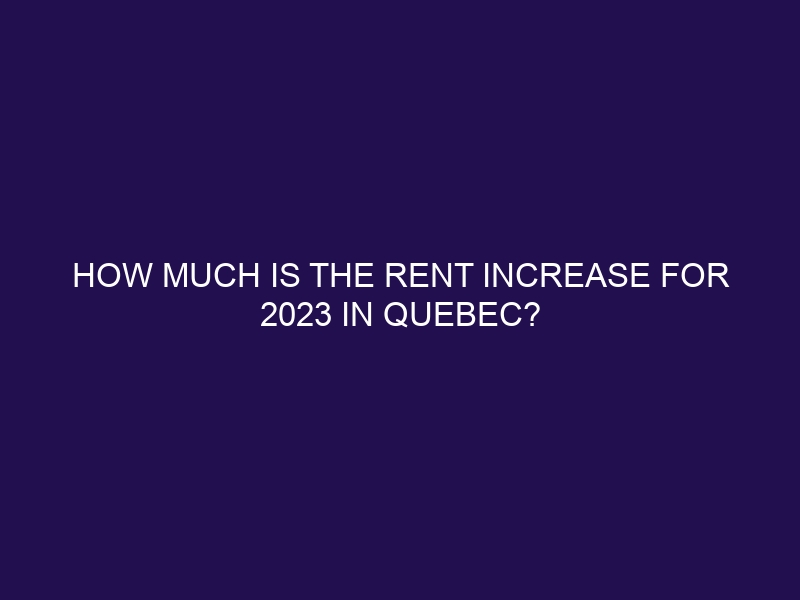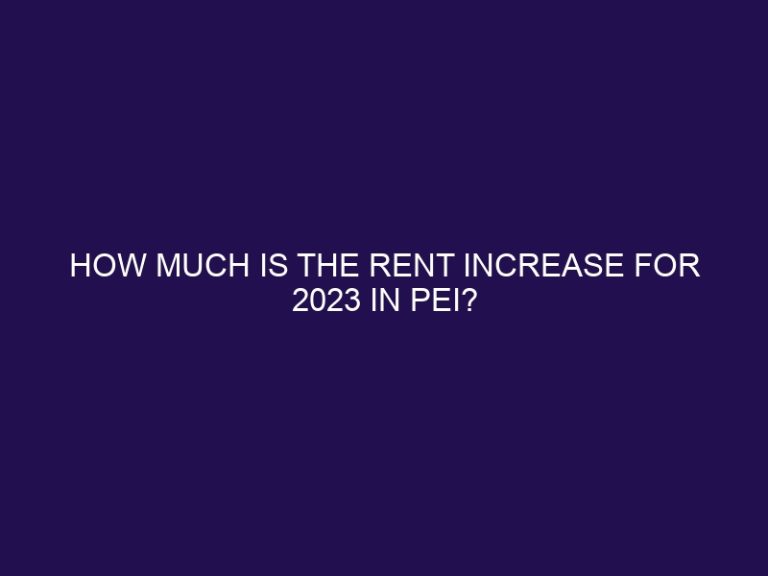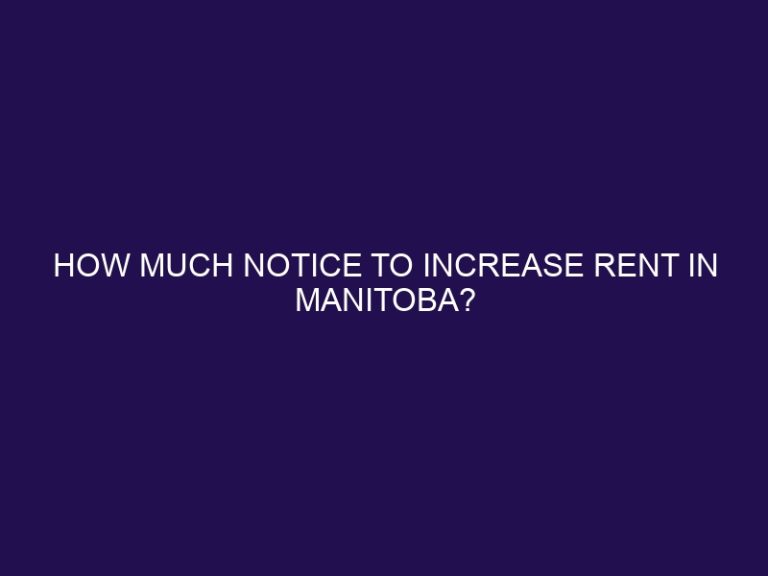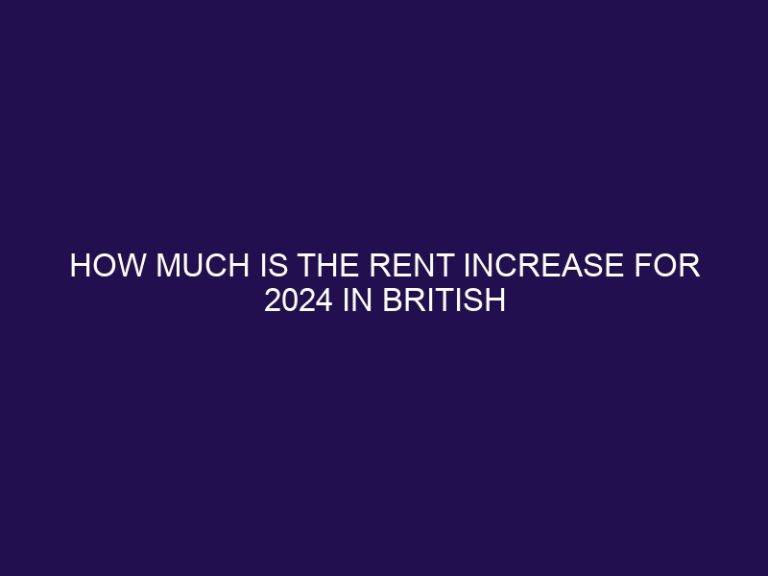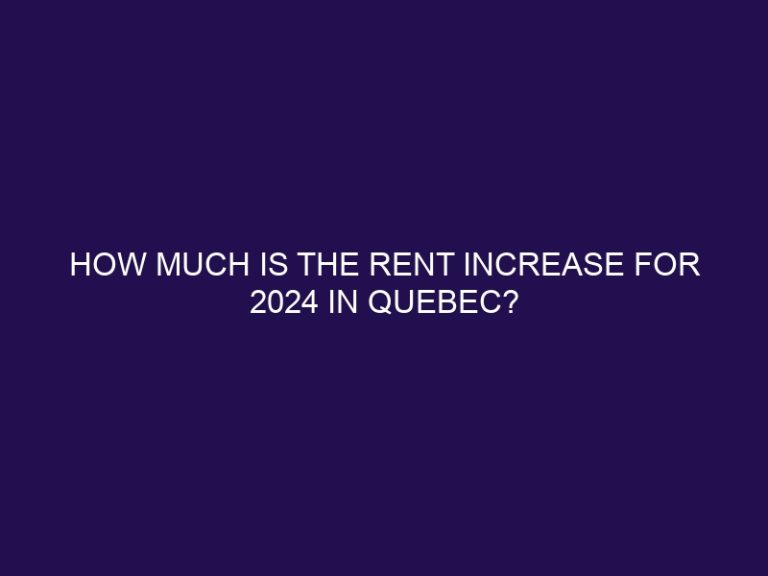How much is the rent increase for 2023 in Quebec?
.jpg)
Rent increase guidelines in Quebec play a significant role in ensuring fair and regulated housing costs for tenants. Understanding the laws and regulations surrounding rent increases is crucial for both tenants and landlords.
In Quebec, there are specific guidelines in place that govern how and when rent can be increased. These guidelines aim to strike a balance between protecting the rights of tenants and allowing landlords to make necessary adjustments based on market conditions.
Exceptions to these guidelines exist, and it’s essential to be aware of them to fully understand your rights as a tenant. Some factors, such as the age and type of the dwelling, can impact the rules regarding rent increase.
Several factors are taken into consideration when calculating the permissible rent increase. The Rental Board considers elements like municipal taxes, insurance premiums, energy costs, and maintenance expenses. Inflation has a direct influence on determining the maximum rent increase percentage.
For the year 2023, tenants in Quebec can expect a specific percentage increase in their rent. This percentage is determined based on various factors, including the rental market conditions and the Consumer Price Index.
Tenants who receive a notice of rent increase should know their rights and how to appropriately respond. Understanding the options available for disputing a rent increase is crucial in ensuring fair treatment and protection against unjustified hikes.
It’s important to note that Quebec has rent control regulations in place to provide additional protection to tenants. These regulations limit the extent to which landlords can increase rent and ensure stability in tenancy costs. Familiarizing yourself with these regulations is essential in understanding how rent control affects rent increases in Quebec.
Key takeaways:
- Rent increase guidelines in Quebec: There are laws and regulations in place to determine how rent increases are calculated, and tenants should be aware of their rights when receiving a rent increase notice.
- Factors influencing rent increase: Various factors are considered when calculating the rent increase, including inflation, market conditions, and maintenance costs. These factors can impact the amount of rent increase tenants may face.
- Expected rent increase for 2023: While the specific percentage is not mentioned, it is important for tenants to be prepared for a potential rent increase in 2023. Understanding their options and potential disputes can help tenants handle a rent increase effectively.
Rent Increase Guidelines in Quebec
In Quebec, the Rent Increase Guidelines are in place to protect tenants from excessive rate hikes. The province’s rental board establishes the maximum allowable increase each year, based on factors such as inflation and market conditions. For 2023, the Rent Increase Guidelines in Quebec specify a limit of 0.9% for rent increases. Landlords must respect this limit unless they encounter special circumstances, such as major renovations. It’s crucial for tenants to be aware of their rights and understand the Rent Increase Guidelines to ensure they are not subjected to unfair charges. By staying informed, tenants can effectively negotiate fair rent increases and maintain affordable housing.
What Are the Laws and Regulations for Rent Increase?
What Are the Laws and Regulations for Rent Increase?
In Quebec, it is important to understand the laws and regulations that govern rent increases. Landlords are not allowed to arbitrarily raise the rent, but instead, they must adhere to the prescribed guidelines. These guidelines take various factors into consideration, such as the Consumer Price Index and the duration of the lease. Exceptions to these guidelines usually arise when significant renovations have been carried out on the property. Tenants must familiarize themselves with these laws to make sure that they are not subjected to unwarranted rent hikes. A helpful tip for tenants is to always consult the Régie du logement or seek legal advice if they have any concerns regarding a rent increase.
Are There Any Exceptions to the Rent Increase Guidelines?
Yes, there are some exceptions to the rent increase guidelines in Quebec. Are There Any Exceptions to the Rent Increase Guidelines? According to the regulations, the landlord cannot increase the rent if the tenant has signed a fixed-term lease that includes a specific rent amount for the entire duration of the lease. If the rental unit is subject to rent control, the landlord cannot increase the rent beyond the allowable percentage set by the government. It’s important for tenants to be aware of their rights and consult the rental board or seek legal advice if they believe their landlord is not following the rent increase guidelines.
Factors Affecting Rent Increase in Quebec
Factors Affecting Rent Increase in Quebec can have an impact on the rise of rental prices in the region. Several elements play a significant role in this regard. The first element is the vacancy rate, which, if low, can lead landlords to increase rent more aggressively. Additionally, property owners take into consideration the cost of property maintenance and operation. Any increases in property taxes and inflation rates can also contribute to rent hikes. Moreover, upgrades or renovations made to the property can justify a higher rental price. It is crucial for tenants to be aware of these Factors Affecting Rent Increase in Quebec and understand their rights when it comes to rental price adjustments in the region.
What Are the Factors Considered for Calculating Rent Increase?
When calculating rent increases in Quebec, several factors are taken into consideration. These factors, including the current rental market conditions, the cost of living, the maintenance and repair costs of the property, and any renovations or improvements that have been made, are all part of what is considered for calculating rent increase. The Regie du Logement, which is the governing body for rental properties in Quebec, also takes into account the average rent in the area and any guidelines set by the government. By weighing these various factors, landlords can determine a fair and reasonable rent increase that aligns with the current rental market and the expenses associated with maintaining the property.
Does Inflation Impact the Rent Increase?
In Quebec, the rent increase is indeed impacted by inflation. The Rent Increase Guidelines take into consideration the effects of inflation when determining the maximum allowable increase. This percentage increase is calculated by considering the average annual change in the Consumer Price Index (CPI) specific to Quebec. It is important to note that inflation directly affects the cost of living, which includes the expenses incurred by landlords for property maintenance. As a result, rental prices are adjusted to accurately reflect the rising costs. For tenants, this means that their rent may increase each year in order to keep pace with inflation.
It is a well-established fact that inflation plays a crucial role in economic decision-making and has a direct impact on various aspects of daily life, including rental prices.
2023 Rent Increase Percentage
The rent increase percentages for 2023 in Quebec vary depending on the type of dwelling. Here is a breakdown of the percentages for different types of rental properties:
| Apartment Buildings | 1.8% |
| Mobile Homes | 1.2% |
| Non-Profit Housing | 1.5% |
Please note that these 2023 rent increase percentages are based on the regulations set by the Quebec Rental Board and may be subject to change. It’s important to stay informed about the latest updates to ensure compliance with the law.
Historically, Quebec has implemented rent control measures to protect tenants from excessive rent increases. The government aims to strike a balance between ensuring affordable housing and allowing landlords to cover expenses and make reasonable profits. By setting the 2023 rent increase percentages, the government aims to provide stability and fairness in the rental market.
What Is the Expected Rent Increase Percentage for 2023?
The expected rent increase percentage for 2023 in Quebec will be determined based on various factors. While the specific percentage is not mentioned in the article, it is influenced by factors such as the Consumer Price Index (CPI), inflation rates, and the rental market conditions. Landlords in Quebec are legally allowed to increase rents within certain guidelines set by the Régie du logement. It is important for tenants to be aware of their rights and options when faced with a rent increase. Consulting with a lawyer or seeking advice from tenant associations can help tenants navigate and negotiate fair rent increases.
In a similar vein, history has shown that the expected rent increase percentage for a given year can vary depending on economic conditions and government policies. For example, during periods of high inflation, rent increases may be higher to account for rising costs. On the other hand, in times of economic downturn, rent increases may be more moderate or even frozen to protect tenants. It is crucial for both landlords and tenants to stay informed and understand the factors influencing rent increases in their respective regions.
The expected rent increase percentage for 2023 in Quebec will depend on several factors, but the specific percentage is not mentioned in the article. It is influenced by the Consumer Price Index (CPI), inflation rates, and the rental market conditions. Landlords in Quebec have specific guidelines set by the Régie du logement that allow them to increase rents. Tenants should know their rights and options when faced with a rent increase. Seeking advice from tenant associations or consulting with a lawyer can assist tenants in navigating and negotiating fair rent increases.
The expected rent increase percentage for a specific year is known to fluctuate based on economic conditions and government policies. In times of high inflation, rent increases may be higher to accommodate rising costs. Conversely, during economic downturns, rent increases may be more moderate or even halted to protect tenants. It is important for both landlords and tenants to stay informed about the factors that influence rent increases in their respective regions.
How Is the Rent Increase Percentage Determined?
The rent increase percentage in Quebec is determined by the Régie du logement, the governing body responsible for regulating rental prices. They take into account factors such as inflation, the cost of maintenance and repairs, property tax increases, and the overall economic climate. So, you might wonder, “How Is the Rent Increase Percentage Determined?” Well, the Régie du logement uses a formula to calculate the maximum allowable rent increase each year. This formula is based on a percentage tied to the average increase in the Quebec consumer price index. Through this method, the Régie du logement ensures that the rent increase is fair and reasonable for both landlords and tenants.
How to Handle a Rent Increase
- Handling a rent increase can be a challenging situation for tenants. Here are some steps to navigate through the process:
- Review your lease agreement to understand the terms and conditions.
- Research the local laws and regulations regarding rent increases in your area.
- Calculate the percentage of the increase to determine if it complies with the legal limit.
- Communicate with your landlord to discuss the reasons behind the increase and negotiate if possible.
- Consider seeking advice from a tenant rights organization or legal professional for guidance.
- Decide whether to accept the increase, negotiate further, or explore alternative housing options.
- Document all communications and store copies of relevant documents for future reference.
How Should Tenants Respond to a Rent Increase Notice?
- When tenants receive a rent increase notice, they may wonder how they should respond. Here are several steps they can take to address the situation effectively:
- Review the notice: Begin by carefully reading the notice to understand the specifics of the increase, including the amount and effective date.
- Research the law: It is crucial to familiarize yourself with the rental laws applicable in your specific jurisdiction. This will help you determine if the increase falls within legal limits.
- Communicate with the landlord: Reach out to your landlord and initiate a discussion about the increase. Try to negotiate a reasonable compromise that is suitable for both parties.
- Seek legal advice: If you believe the increase is excessive or unfair, consider consulting with a lawyer or a tenant rights organization. They can provide guidance and help you understand your rights.
- Consider relocation: If the rent increase proves to be unaffordable or unreasonable, it may be necessary to explore other housing options that better fit your budget and needs.
What Are the Options for Disputing a Rent Increase?
What Are the Options for Disputing a Rent Increase?
When faced with a rent increase in Quebec, tenants have several options for disputing it. These options include:
| 1. Negotiation: | Tenants can try to negotiate with their landlord to reach a mutually acceptable rent increase amount. |
| 2. Mediation: | Mediation services can be used to help tenants and landlords resolve their dispute through a neutral third party. |
| 3. Filing a complaint: | Tenants can file a complaint with the Regie du logement, the government agency responsible for overseeing rental disputes in Quebec. |
| 4. Requesting a review: | Tenants can request a review of the rent increase by the Regie du logement to determine if it is justified and complies with the rules and regulations. |
| 5. Seeking legal advice: | Tenants can consult with a lawyer or legal clinic to understand their rights and get guidance on how to dispute the rent increase. |
By exploring these options, tenants can effectively navigate the process of disputing a rent increase in Quebec.
Understanding Rent Control in Quebec
Rent control is crucial in Quebec, especially for tenants and landlords. It serves as a mechanism to safeguard tenants from exorbitant rent hikes and brings stability to the rental market. In Quebec, rent control regulations dictate that landlords can only increase rents by a predetermined percentage, which is established annually by the government. This percentage is calculated based on the average rise in the consumer price index and tends to remain lower than inflation. Familiarizing themselves with the concept of rent control in Quebec allows tenants to be well-informed about their rights, while also enabling landlords to ensure compliance with these regulations.
What Are the Regulations Surrounding Rent Control?
Rent control in Quebec is regulated by laws and regulations to ensure fair treatment of tenants. These regulations outline the rights and responsibilities of both landlords and tenants. They cover areas such as rent increase limits, eviction processes, and maintenance standards. The aim of these regulations is to prevent landlords from exploiting tenants and to maintain affordable housing options. For example, landlords are restricted from increasing rents above the limits set by the Régie du logement. Any changes to rental terms or conditions must be approved by the Régie du logement. These regulations provide protection for tenants and help maintain stability in the rental market.
The regulations surrounding rent control in Quebec are designed to ensure fair treatment of tenants and maintain affordable housing options. They outline the rights and responsibilities of landlords and tenants, covering various areas including rent increase limits, eviction processes, and maintenance standards. These regulations aim to prevent exploitation of tenants and restrict landlords from surpassing the predetermined limits set by the Régie du logement. It is crucial that any alterations to rental terms or conditions receive approval from the Régie du logement. By implementing such regulations, tenants are provided with essential protection, ultimately contributing to the stability of the rental market.
How Does Rent Control Impact Rent Increase?
Rent control laws in Quebec have a significant impact on rent increases. How Does Rent Control Impact Rent Increase? Here are the ways in which rent control affects rent increase:
Rent Increase Caps: Rent control regulations set limits on the percentage by which landlords can increase rent per year. This helps protect tenants from excessive rent hikes and ensures affordability.
Guidelines for Exceptions: There are certain situations where landlords may be allowed to increase rent beyond the established caps, such as when major renovations are made to the rental unit.
Stability and Predictability: Rent control provides tenants with stability and predictability in terms of their housing costs, as they can anticipate limited rent increases year after year.
Throughout history, rent control has been implemented in various cities and countries to safeguard tenants from skyrocketing rental prices and to maintain affordable housing options.
Some Facts About Rent Increase in Quebec for 2023:
- ✅ The Tribunal administratif du logement has established the applicable percentages for calculating the 2023 rent adjustment in Quebec. (Source: Our Team)
- ✅ Lessors and lessees in Quebec are free to agree on a rent increase. (Source: Our Team)
- ✅ For buildings constructed within the last five years, a lessee who refuses a rent increase may be required to leave the dwelling if the lease includes this restriction. (Source: Our Team)
- ✅ The rent adjustment in Quebec takes into account municipal and school taxes, insurance, major improvements, and operating costs of the building. (Source: Our Team)
- ✅ The estimated average rent adjustment granted by the Tribunal administratif du logement in previous years from 2014 to 2022 was 3.1% considering capital expenditures. (Source: Our Team)
Frequently Asked Questions
1. How is the rent increase calculated for 2023 in Quebec?
The rent increase for 2023 in Quebec is calculated based on the actual expenses incurred for the building or dwelling. The applicable percentages are determined by the Tribunal administratif du logement (TAL) using the Consumer Price Index for December released by Statistics Canada. Landlords can use the rent increase calculation tool provided by the TAL to determine the appropriate increase, taking into account factors such as municipal and school taxes, insurance, major improvements, and operating costs of the building.
2. Can landlords and tenants agree on a rent increase without involving the Tribunal?
Yes, landlords and tenants in Quebec are free to agree on a rent increase without involving the Tribunal. However, if they cannot come to an agreement, the landlord can file an application to modify the lease with the Tribunal. It is important to note that for dwellings in buildings constructed within the last five years, a tenant who refuses a rent increase may be required to leave the dwelling if the lease includes this restriction.
3. Are there any specific situations that may require a hearing before the Tribunal for a rent increase?
Yes, there are certain specific situations that may require a hearing before the Tribunal for a rent increase. For example, if there are new services resulting in additional management costs, a hearing before the Tribunal may be necessary. The online calculation tool provided by the Tribunal does not account for these specific situations, so it is important to consult the Tribunal for a more precise estimate if such circumstances apply.
4. What is the estimated average rent increase for 2023 in Quebec?
The estimated average basic adjustment for rent in Quebec from 2014 to 2022, considering capital expenditures, was 3.1%. While it is still early to determine the exact percentages for 2023, tenants can expect their rents to go up. In 2022, the TAL granted an average rent adjustment of four percent. The final average rent increase for 2023 will depend on various factors and individual cases.
5. What are the rights of tenants regarding a rent increase in Quebec?
Tenants in Quebec have the right to refuse a rent increase if they believe it is unreasonable. If a tenant decides to refuse the increase, they have 30 days to respond to the notice. If the tenant refuses, it is then up to the landlord to go to the TAL and open a case to set the rent. However, it is important to note that for dwellings in buildings less than five years old, a tenant who refuses a rent increase may be required to leave the dwelling.
6. How much can the cost of heating affect the monthly rent in Quebec for 2023?
The cost of energy, especially natural gas and heating oil, can significantly impact the monthly rent in Quebec for 2023. According to the estimates by the TAL, an oil-heated dwelling with a monthly rent of $1,000 could cost up to $80 more per month. A natural gas-heated dwelling could cost around $1,052 per month, while an electricity-heated dwelling could cost approximately $1,034 per month. An unheated unit with a rent of $1,000 could cost around $1,029 per month in 2023.

